Tetbet review - where crypto meets betting
Perfect combination of crypto, sports and betting. One-stop to fit all your sports fan needs, matched with an excellent welcome bonus that is easy to unlock.

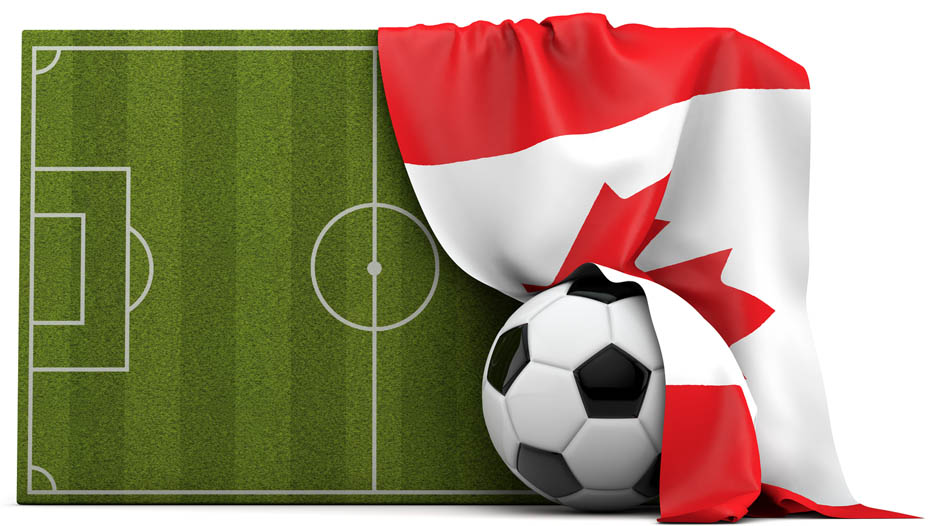
Hockey is of course THE Canadian pass time and will remain so. Toronto Raptors are more than enough for the presence of basketball in the Great White North. Cricket is a remnant of the connection to the British crown. Lacross is a hockey substitute frankly. While Curling isn’t as peculiar there. Yet the very international nature of Canada made the country fertile for the world's biggest sport - football. As frozen as the pitch might be, the Canadian national soccer team is a squad on the rise and is carrying the torch for football in the second-largest country in the world.
With the country co-hosting the 2026 World Cup with the United States and Mexico, we’re entering the era that can fast-track Canada’s soccer into the top three sports of the nation.
The Canucks, as is the common nickname for Canadians in general, as so for the national team, have a seemingly exciting few years ahead of them. With a young team itching to make a break the stereotypes and reshape football’s landscape continentally and broader.
Football was played in Canada earlier than in some areas of England, as the ball was kicked around the cold hard grassland since 1859. With the first inter-country match played against, who other, than their neighbours below, back in 1885. The start of Canada's most important and possibly only rivalry.
A group of amateur players from Britain toured Canada in 1905 and faced the national side of hosts in a match that was marketed as the "championship of the world." Played in front of 3,500 fans, it ended with a score of 3:3.
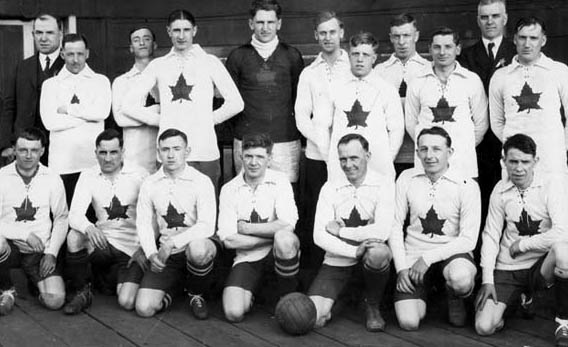
By Unknown author - Here, Public Domain, Link
While the Canadians did their own touring in 1924, going to the other largest country of the British Commonwealth, Australia. Yet in Brisbane, the Aussies were better in a friendly 3:2. At that time, tours were the way to go for most countries outside of Europe and South America. So in 1927 in a tour of New Zealand, Canadians played 22 games, including four against the host nation.
Canada's soccer history is surprisingly wild, as the country withdrew from FIFA in 1928 due to a dispute regarding payments to amateur players. They only rejoined in 1946, but took part in the qualifications for the World Cup for the first time in 1957. Their first game played again as a national team in 30 years was one to remember, beating the United States 5:1 in front of the home crowd in Toronto!
Alas, another win over the U.S. was annulled by two losses to Mexico, which meant Canada missed out on the World Cup.
The peculiar trajectory of Canadian football continued in the next World Cup cycles, as the team withdrew from the qualifiers for the 1962 and 1966 tournaments.
Only in 1986 did Canada qualify for their first-ever World Cup, luckily for the home fans, it was happening in Mexico. Yet the group with France, Hungary, and the Soviet Union proved understandably too tough for the debutants.
Canada qualified for the WC 1986 by winning the CONCACAF Championship the year prior. Of course, CONCACAF stands for Central American and Caribbean Association Football. An equivalent to UEFA in Europe.
The format saw three groups, each with three countries each playing against each other twice until the group winner progressed into the final stage. Once again, a three participants group saw the winner crowned as a champion and qualify for the World Cup. Canada's first group had Guatemala and Haiti, while Honduras and Costa Rica were the opponents in the final round.
Exactly 15 years later, Canada won the successor of the CONCACAF Championship, the Gold Cup.
Again, very peculiarly as firstly Canada didn't enter the competition automatically due to being the lowest-ranked member of the North American Football Union, but had to qualify for it. Then, at the Gold Cup, in all three games played in their group ended with draws, Canada tied with the Republic of Korea on every tiebreaker, and a coin toss was used to determine who will proceed.
Canada defeated the defending champions Mexico in the quarter-finals 2:1 with a golden goal in extra time. Semis saw Trinidad and Tobago falter 1:0 in front of Canada.
At The Memorial Coliseum in Los Angeles, Canada defeated the invitees to the tournament Colombia 2:0. Recording the biggest success of Canada's national soccer team to date.
The win at the tournament didn't bring the qualifications to the World Cup anymore. Rather for the Confederations Cup, a tournament played in the country of the next World Cup hosts, a year in advance. In the group with Brazil, Cameroon, and hosts Japan, Canada got only a single point, drawing with the ultimate favourites Brazil.
Canada also won the minor and short-lasting North American Nations Cup tournament, which was first held in 1947 and 1949. Revived after a 41-year absence in 1990, Canada was the third-ever NANC winner, meaning it defeated Mexico and the United States in the two matches they played in a group.

By Unknown author - Here, Public Domain, Link
Of course, Canada was also the winner of the 1904 Summer Olympics in football, which sounds like by far the biggest win of the country's soccer history. Until you find out that only United States and Canada participated. Oh, and Canada played under the name Galt F.C., while St. Rose Parish and Cadets of Christian Brothers College were American representatives. FIFA doesn't even recognize this contest as no nation-states participated officially, but the International Olympic Committee does.
Since Mexico in 1986, Canada didn't manage to get to the World Cup tournament, until 2022. Maybe the winter schedule allured the northern country more. Although, the desert of Qatar doesn't even resemble summer in the Great White North.
A new generation of players put Canada on the map again. It's not harsh to say that for the first time ever, Canada had players with a global reputation. Alphonso Davies of Bayern Munich was the Champions League winner. While Jonathan David moved to Lille in a €30,000,000 deal!
Passing through two rounds of qualification to reach the final, third stage with eight teams in a single group, Canada had a long road to Qatar. One that they finished first with 28 points in 14 matches, joint with Mexico but with a better goal difference. Conceding only seven goals total.
It was not only the first time Canada was at the World Cup since 1986, but the first time they actually progressed to the third round of World Cup qualifiers since 1997!
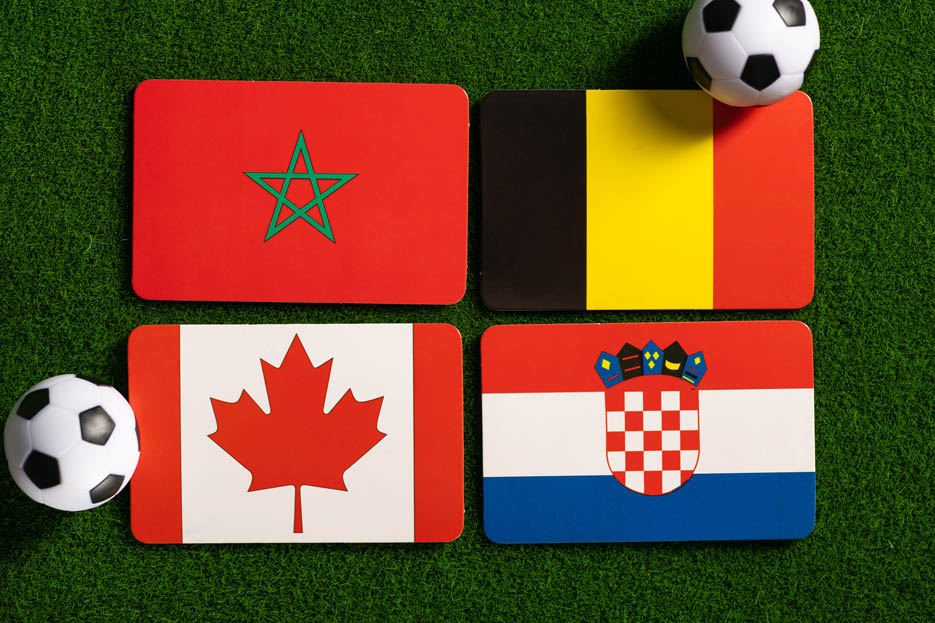
After the World Cup in Qatar, some Canadian soccer fans are claiming that they had the toughest group. Simply because they were pitted against Belgium, but also the last tournament second-placed in Croatia. This was known before the tournament. Yet Morocco's push to the semis made Cannucks all that more certain that they were given an impossible task.
Even though the side endured three defeats, one of them by a large margin, the general notion from the tournament was hopeful and prideful. Even though the team lost the first game to Belgium 1:0, the common sentiment was that Canada outplayed the favoured European side. The beginning of a match against Croatia in the second round added fuel to the fire of hope, as Davies scored in the second minute! Yet the vice champions at the time responded with a 4:1 trashing. Morocco finished off the Canadians with a 2:1 defeat in which.
A drawback was that in 270+ minutes, only Davies managed to score for Canada, as the goal against Morocco was an own goal.
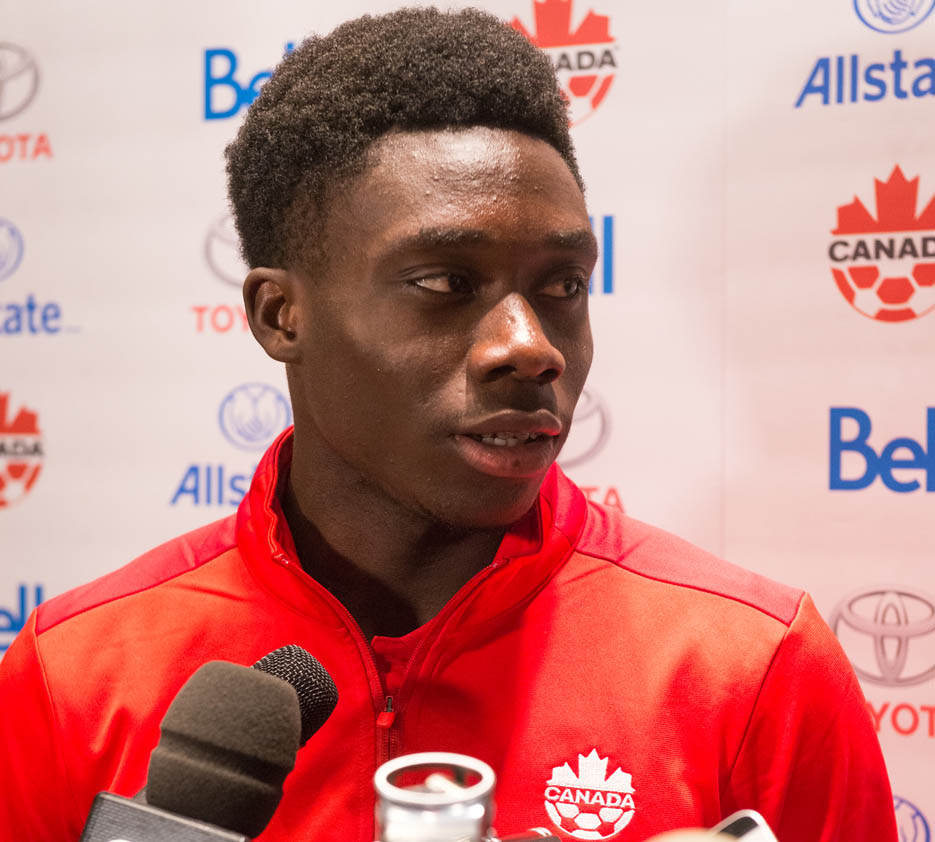
As a Champions League winner already, becoming one as a teenager, Alphonso Davies is certainly the face of the Canadian football team. Aged 22, the left back will certainly remain so for years. And has been already, as he has 39 appearances for the national side already.
Making his debut for the NT aged 16 years and seven months, it's not hard to realize how come. Having scored 13 goals already as well, as left back or a wing back, 22-year-old Davies is a goal away from becoming one of the top 10 goalscorers of the Canadian national soccer team.
Actually, he's not far from reaching the number one spot as well, currently held by Cyle Larin with 28 goals. He is also the youngest scorer for his national team, bagging one goal a month after his debut.
The second face of the current national team of Canada is Jonathan David, a centre-forward for Lille in France following his record-setting transfer in August of 2020 for €30,000,000! Becoming the most expensive Canadian player ever.
David has already played 40 games for the national side, scoring 24 goals and he is destined to be the country's top goalscorer by some margin, as he is only 23 now. Born in Brooklyn, USA, David moved back to his parents' home country Haiti briefly after being born. Before another immigration this time to Ottawa, Canada.
In general, the current national team of Canada is filled with young players, almost all ofthem on the right side of 30. With few but notable exceptions.
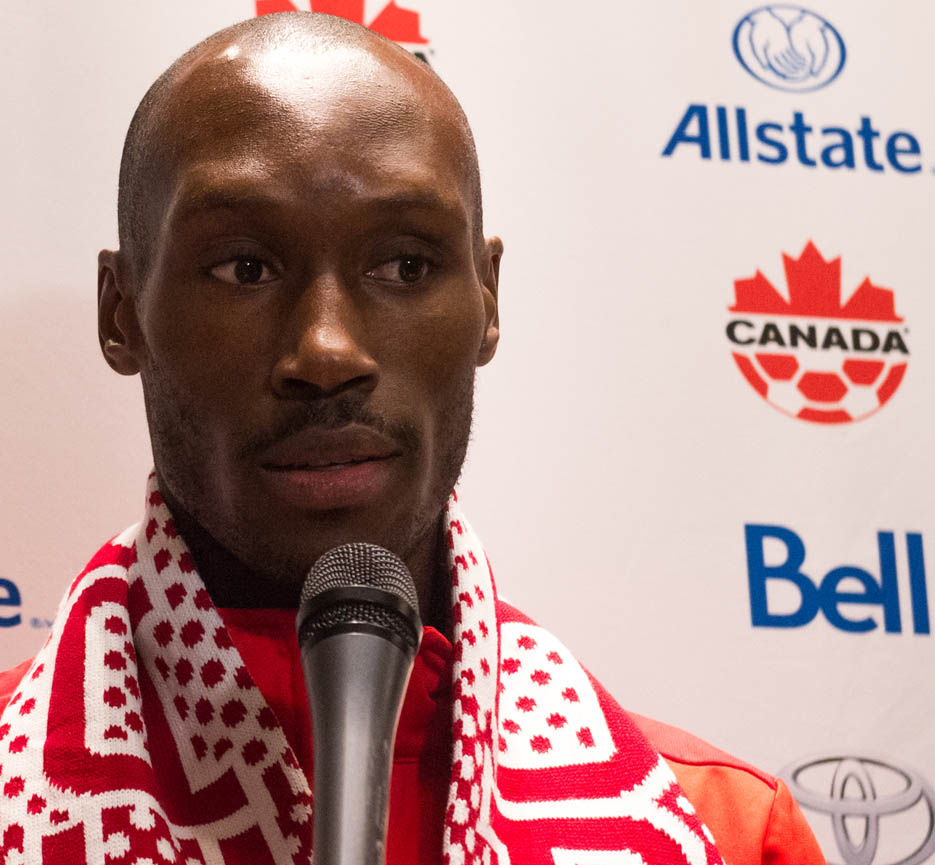
Atiba Hutchinson is the 40-year-old captain of the Canadian national soccer team. As well as the record holder for most appearances for the country - 103! The longtime Besiktas midfielder is in front of the retired Julian de Guzman (89), Paul Stalteri (84), and Randy Samuel (82).
Of his current teammates, the most capped player is 36-year-old Milan Borjan, with 72 caps. The goalkeeper plays for the former champions of Europe Red Star Belgrade on a club level and is one of the mainstays in the national team for a while now.
While the 28-year-old Samuel Piette defensive midfielder for the domestic CF Montreal has 66 appearances and is the third active most-capped Canadian.
Although besides Davies and Johnatan David, the most well-known Canadian international is certainly Junior Hoilett. A veteran of 161 Premier League games was born in Canada and has represented the country at the 2022 World Cup as well.
Now, Canadian football fans are placing a lot of their hopes in Alistair Johnston, a 24-year-old right-back for Celtic in Scotland. Who is younger than Alphonso and Jonathan, but seemingly has a lot more to show left, and according to the Cannucks is the most promising Canadian player yet to hit the biggest stage.
It sounds peculiar at first sight, as the Canadians have the best stereotype of all the countries - being too nice - yet the Cannucks take their gloves off when it comes to sport. A habit from growing up playing hockey.
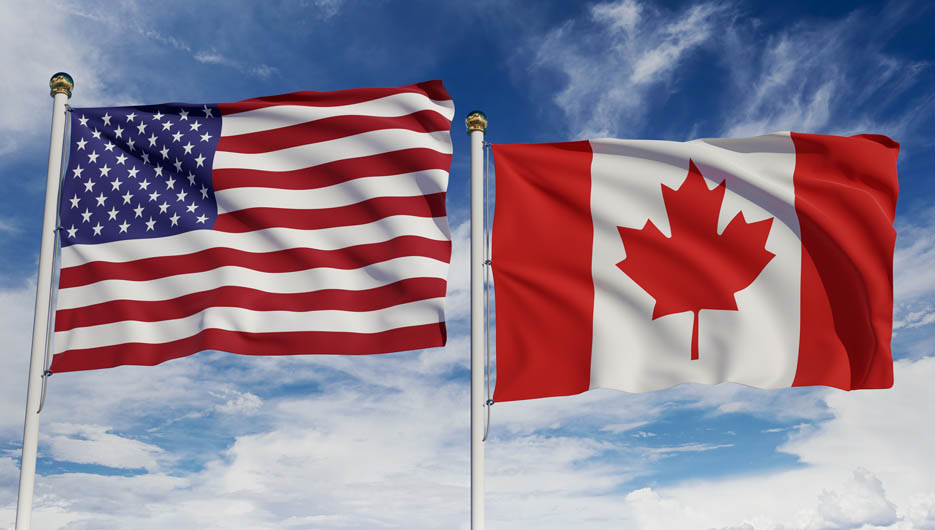
As is tradition on planet Earth, who are you going to battle the most - your closest neighbours. Actually, in Canada's case, the only ones.
We mentioned that there is no older footballing contact for Canadian soccer than the US, and years of playing in the same competitions have only made a mound of an ant hill. Of course, the United States have the upper hand simply by pointing to their World Cup participation record, of which they have 11. Compared to Canada's fresh two.
Until recently, the United States team didn't know defeat at the hands of their northern neighbours for 34 years! Until the streak was snapped at the BMO Field in 2019. All in all, the countries have faced up 38 times, with Canada winning 10 times, losing 17, and draws happening on 11 occasions.
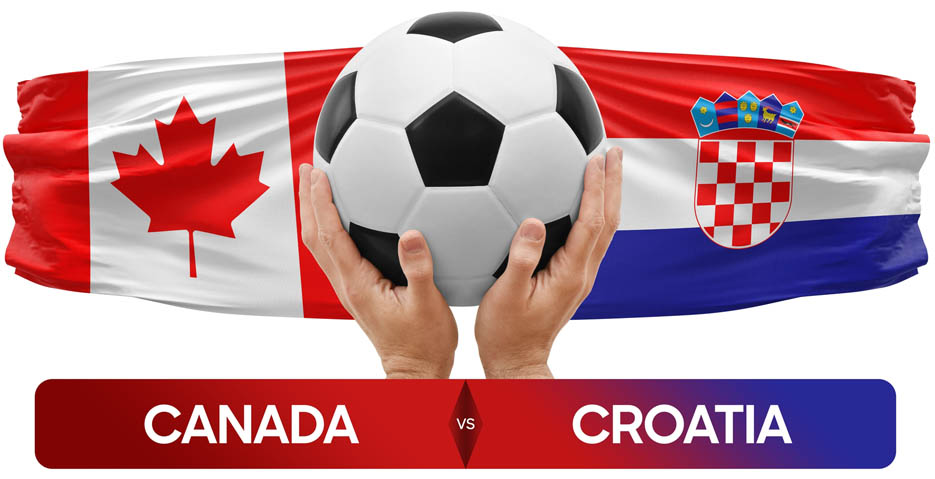
A rivalry of a single match, yet things got pretty heated between Croatia and Canada at the World Cup in Qatar that it has to be mentioned. As it’s Canada’s first proper rivalry, and by proper we mean more of the European and South American variety. With actual bad feelings, harsh words, and flared tensions. Not just sporting/accent teasing as in with the USA.
Following the match Canada lost against Belgium, even though they outplayed the European side with 21 goal attempts to nine. This prompted the Canada national team manager to give a rousing team talk to his side and the journalists asked him to reveal his words.
"I told them they belong here. And we’re going to go and eff Croatia," the coach said jokingly, avoiding using profanity due to being on television.
Yet, Croatians didn't receive the words with a smile and a nod. Especially their tabloids, that went ballistic after the manager of the Cannucks. With one publication going as far as putting Herdman's face on a male nude body, with a small maple leaf covering his sensitive region. The manager did know how to handle the situation humorously, noting that the model used for the cover was far leaner than he was.
"When you get a text from your wife telling me you need to start working out before you get home, yeah, you think you know something’s going on. My wife’s coming after you guys. She wishes she got that guy. I’ve got a bit more of a belly than that. I’ve been eating too much," said Herdman.
Firstly, because a major part of Canada also speaks French, it’s worth noting that the team is also known as Équipe du Canada de soccer.
Since 1986, Canada’s football team shirts were predominantly red for the first garment. While the secondary shirts were white with red details or sometimes red shorts. Canada's football kits are currently made by Nike, since 2019. After seven years with Umbro.
Canada’s national soccer team stadium alternates, yet the majority of the games are played BMO Field in Toronto. Which is home to Toronto FC of Major League Soccer and the Toronto Argonauts of the Canadian Football League with a capacity of just over 30,000.
Yet the matches are also played sometimes at BC Place (Vancouver), Tim Hortons Field (Hamilton), and Commonwealth Stadium (Edmonton).
The biggest victory of the Canadian national soccer team happened in 2021, when the Cayman Islands were shaken with an 11:0 defeat in the World Cup qualifiers.
Canada's heaviest defeat happened in 1993 at the hands of Mexico, who celebrated an 8:0 win at the Gold Cup!
In more recent times, 2012, Honduras recorded a surprising 8:1 dismantling of the much more populous country in the WC qualifiers.
Canada is currently enjoying a national record of 15 matches at home including a joint-record seven-match home win streak. A testimony to the work their manager Josh Fremd has been doing. 
Yes, both Alphonso Davies and Jonathan David are much more well-known. And yes, Josh Fremd isn’t even Canadian, the tactician was born in the north of England and remains in possession of a charming accent. Yet, his route to the job posting of Canada's national team manager, and the path to leading a side at the World Cup, is a rather peculiar one.
Yet he started his career in New Zealand, leading the country's women's soccer team and doing so for five years between 2006 and 2011!
Then, he moved to the job of the manager of Canada's women's national team where he stayed for seven years, until 2018! Winning two bronze medals at the Summer Olympics, in 2012 and 2016.
In an unprecedented case, the Englishman John Herdman then proceeded to take the reigns over the men's national team of Canada! Now standing on the sidelines for 52 matches, with a great win ratio of 65.38%.
That is helped by the level of competition Canada faces, sure, yet no one can deny that Herdman is doing a great job. A reminder that the side had to start the CONCACAF qualifications in the first round should be enough to convince anyone.
Standing only 1 metre and 65 centimetres tall, John Herdman's love for football shines far above his weight class. The 47-year-old even held a Ted Talk trying to convey the symbolic importance of Canada's national anthem, in a motivation junkie's desire to inspire more than just the 11 men on the pitch.
John Herdman's son Jay, aged 18, has now represented both New Zealand and Canada at a youth level, so it's safe to say that Herdman senior is a Cannuck too, one way or another. So John Herdman is helping players develop at home and on the job. As we see Scandinavian countries like Norway - with Erling Haaland and Martin Odegaard - producing world-class players, it suggests that Canada's national soccer team could be on that way as well.
Then in a tournament, led by domestic support, anything is possible. Certainly a leap or two more.

Perfect combination of crypto, sports and betting. One-stop to fit all your sports fan needs, matched with an excellent welcome bonus that is easy to unlock.
Major shifts and absences in Canada’s national team ahead of the Gold Cup 2023 in which the country is still the third favourite to triumph.
Thomas Tuchel stated there will be a punishment for the international and that he will accept it.
A Premier League veteran also echoed the same sentiments on statistics not being the be-all, end-all metric.
The 21-year-old Serbian is on a particularly hot streak of consecutive games in which he scored.